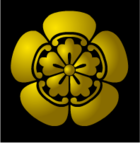Oda family
| Oda clan 織田氏 |
|
|---|---|

The emblem (mon) of the Oda clan
|
|
| Home province | |
| Parent house | Taira clan |
| Titles | Various |
| Founder | Taira no Chikazane (Oda Chikazane) |
| Final ruler | Oda Nobutoshi |
| Founding year | 13th century |
| Dissolution | still extant |
| Ruled until | 1871, abolition of the han system |
The Oda clan (織田氏 Oda-shi) was a family of Japanese daimyōs who were to become an important political force in the unification of Japan in the mid-16th century. Though they had the climax of their fame under Oda Nobunaga and fell from the spotlight soon after, several branches of the family continued as daimyō houses until the Meiji Restoration.
The Oda family in the time of Nobunaga claimed descent from the Taira clan, by Taira no Chikazane, a grandson of Taira no Shigemori (1138–1179).
Taira no Chikazane established himself at Oda (Echizen Province) and took its name. His descendants, great vassals of the (Seiwa Genji) Shiba clan, shugo (governors) of Echizen, Owari and other provinces, followed the latter to Owari Province and received Inuyama Castle in 1435. This castle was built towards 1435, by Shiba Yoshitake who entrusted its safety to the Oda family. The Oda had been shugo-dai (vice-governor) for several generations.
In 1452, after the death of Shiba Yoshitake the vassals of the Shiba, like the Oda in Owari Province and the Asakura clan in Echizen Province, refused the succession of Shiba Yoshitoshi (1430–1490) and supported Shiba Yoshikado (died ca. 1480), and began to divide the large domains of their suzerains among themselves, and had become gradually independent in the domains which had been confided to them. In 1475, the Oda had occupied the greater portion of Owari Province, but the Shiba would continue to try to regain authority until Shiba Yoshikane (1540–1600), who had to leave Owari.
...
Wikipedia
